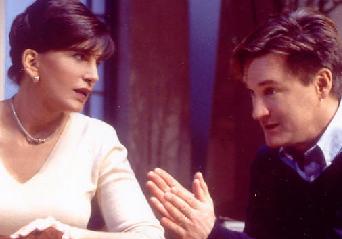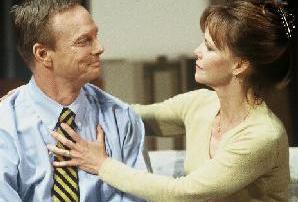SEARCH
REVIEWS
FEATURES
NEWS
Etcetera and
Short Term Listings
LISTINGS
Broadway
Off-Broadway
NYC Restaurants
BOOKS and CDs
OTHER PLACES
Berkshires
London
California
DC
Philadelphia
Elsewhere
QUOTES
On TKTS
PLAYWRIGHTS' ALBUMS
LETTERS TO EDITOR
FILM
LINKS
MISCELLANEOUS
Free Updates
Masthead
A CurtainUp Review
Edward Albee's The Goat or Who Is Sylvia?
By Elyse Sommer
February 7, 2004 update: Review of the Play's London Debut
plot details not included here
|
A New Couple Does Battle in The Goat
Sally Fields makes a triumphant Broadway debut as Stevie in The Goat. She, along with Bill Irwin as the new Martin, prove that Edward Albee's play withstands the test of time and cast changes. Much as I admired Mercedes Ruehl and Bill Pullman, it's the impact made by this second cast that confirms and, in fact, intensifies the play's power. Those who've never seen the play can rest assured that Fields and Irwin, while bringing their own interpretation to the roles, fully capture the pain of love under siege. Fields' Stevie is a more vulnerable, more typically average suburban woman, less likely to shout and break dishes than the more elegant and forceful Stevie-à-la-Ruehl. When she does break her first expensive piece of pottery she looks visibly startled at her loss of control. This vulnerability works well in connecting the audience to her despair. Bill Irwin, has shed the rubber-bodied clown persona for which he is best known (e.g. Fool Moon), to convincingly portray the anguish of a man caught up in situation that has turned his happy and controlled world spinning out of control. Having seen the play when it opened (see review below) I'm grateful to the new Stevie and Martin for giving me a chance to re-evaluate it overall. It resonated even more strongly than before, so that my reservations seem to have melted away. The fact that Jeffrey Carlson is better than ever as Stevie and Martin's son and that Stephen Rowe has enriched the character of the friend Martin calls a Judas, contributes to this impression. My putting the plot details on a separately linked page is no longer necessary since current audiences come to the Golden fully aware that Sylvia is not another woman but a goat. It is the effect of how the people on stage deal with Martin's digression that gives The Goat its suspense. Interestingly, as the audience laughs knowingly at all the early references pointing to the awful truth to come, the brief father-son kiss still brings several loud gasps. Could it be that bestiality isn't the last taboo for Mr. Albee to use as a means to examine what love can and cannot encompass? -- Elyse Sommer |
---Our Original Review

Mercedes Ruehl & Bill Pullman
(Photo: Carol Rosegg)
|
Martin is a successful architect who is at the top of his game so that turning fifty should cause less than the usual midlife trauma. As he prepares for a television interview in connection with his winning the prestigious Pritzker Prize, he and Stevie banter back and forth like characters who've wandered in from a Noel Coward play. But don't be fooled by that opening scene. Mr. Albee has not turned over a new leaf to write drawing room comedies and relinquish his role as a provocateur.
Stevie and Martin's twenty-two happy, loving years together differentiate them sharply from Agnes and Tobias (Delicate Balance) or George and Martha (Who's Afraid of Virginia Woolf). They have a good relationship with their gay son Billy (Jeffrey Carlson). But they too are crisis prone.
Instead of the undefined fear of the neighbors that causes havoc in A Delicate Balance and the imaginary baby and disastrous visit from the young couple in Virginia Woolf, we now have the revelation of a shocking transgression on Martin's part to turn this tranquil home into a battlefield from which no winners may emerge. The secret is, to put it mildly, dramatic and understandably threatening to Martin's family and his career. Stevie's reaction when the secret comes out leads to the play's fiercest and funniest middle scene.
Given the terrific performances of its two leads, Albee's as always wickedly funny and full of sly word play script and David Esbjornson's well-paced direction, The Goat, though not on a par with the above mentioned plays, makes for a stimulating evening. You may walk out of the theater feeling that the playwright has taxed your credulity and with a sense of being left stranded. But that's Albee's own secret -- even when he's at less than his best, you find yourself thinking about what you saw and beginning to see through the surface layers.
Except for the whys and what ifs and what's nexts, this play is no more a mystery than it is a frothy comedy. And while the question "Who is Sylvia?" is answered early on, the less you know about what to expect, the more open you'll be to what takes place. Those who like their plot details immediately and complete can satisfy their curiosity by going here. In the meantime, I'll let this summary from an author interview in Playbill suffice:
"It's about four human beings and a goat . . . and it involves relationships."
Whether the premise for exploring his theme strikes you as silly or inspired, you won't be bored, nor will you have to struggle to understand what's going on. This is Albee at his most accessible.
John Arnone's set, with its African art objects, walls of books and Eames leather chairs, immediately establishes the upper-middle class suburban environment. The opening scenario builds on this picture of an American family reaping the rewards of talent and hard work. It also hints at the precariousness of their (and our) routine patterns. Martin seems inordinately forgetful; Stevie's comment that "the sense that everything's going right is a sure sense that everything's going wrong." The allusion-filled opening interchange between husband and wife ends with the arrival of Martin's old school chum Ross (Stephen Rowe), who will conduct the interview. That interview leads to the opening of Albee's Pandora's box: Martin tells Ross what he's been unable to tell his wife.
The revelation is a bombshell, the author's way of testing the audience's tolerance. It may bewilder and offend, but if you take the leap into his mindset, you will eventually come to realize that tolerance is the key to the play's meaning. In a world where the borders between what is "sick" and what is "normal" are constantly eroding, our capacity for tolerance is constantly being tested. Modern, intelligent liberals like Stevie and Martin accept their son's homosexuality (something still classified as sick in the seventy-year-old Albee's youth). However, as they grapple with a still closeted taboo, their tolerance of Billy's sexuality proves itself to be still fraught with reservations. The taboo used to explode the surface of this family's contentment may also be seen as Albee's attack on a society so bland that it fosters extreme behavior.
It is during the battle royal that Albee's dialogue is at its most incisive. Mercedes Ruehl brilliantly conveys Stevie's rage and pain, a pain so intense that it prompts several primal screams and the breaking of some of the carefully arranged, costly art objects. She intersperses these outbursts with cannily timed, laugh out loud lines, laced with allusions that include a paraphrase of the Shakespeare song of the secondary title. At one point The Goat inadvertently links itself to The Guys (Our Review), Ann Nelson's dramatized response to the intolerable events of 9/11. As the woman in that play talks about her unwillingness to accept the tragedy of that day and wishes for some magic camera trick to take us back to happier times, so Ruehl declares she'll never be really ready to understand what has happened: "I want the whole day to rewind -- start over. I want the reel to reverse."
Pullman is a fine foil for Ruehl's flamboyance, more low key and ordinary but that very ordinariness suits the concept that strange things befall ordinary people and our response as humans (as opposed to beasts) should be compassionate. While Ruehl gets the play's best lines, Pullman isn't short-changed. His humor is more likely to pass unnoticed, like a reference to that absurdist Arthur Kopit title Oh, Dad, Poor Dad, Mama's Hung You in the Closet and I'm Feelin' So Sad. Unlike Ruehl, he doesn't raise his voice but his despair is unmistakable, as when he tries to explain himself with " . . .don't you see the 'thing' that happened to me? What nobody understands? Why I can't feel what I'm supposed to!? Because it relates to nothing? It can't have happened! It did, but it can't have!" His anguished " I am alone. . . all alone" seems written in blood.
The Goat's weakest link is the hateful Ross. Stephen Rowe is woefully miscast and does little to make his character anything more than a plot device. Having him just happen to walk into the room during an emotional moment between father and son is unworthy of either or both playwright and director -- the dollop of incest in that scene also seems superfluous. Jeffrey Carlson gives an endearing portrayal of Billy (that's as in billygoat, another bit of Albee playfulness).
As for the goat, it's a she and some may connect her with some not atypical Albeeian religious symbolism. That's not to say that she's fictitious. She does make an appearance -- though one that's unlikely to win a Tony nomination.
LINKS
The Goat the plot fully detailed, including the end
CurtainUp's Edward Albee Backgrounder

6, 500 Comparative Phrases including 800 Shakespearean Metaphors by CurtainUp's editor.
Click image to buy.
Go here for details and larger image.




